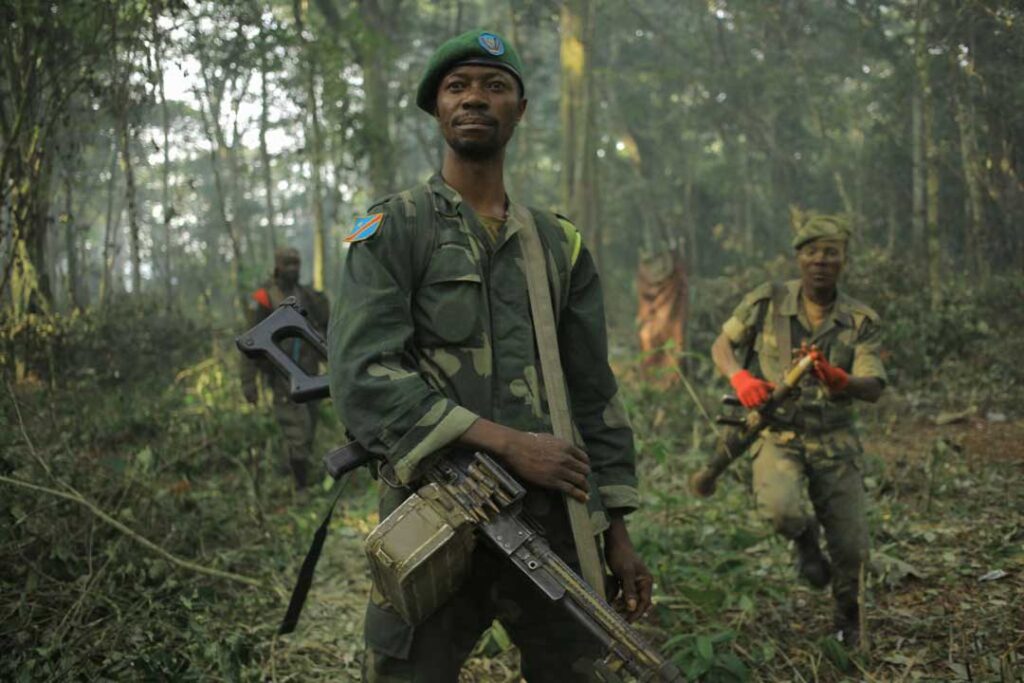ADF STAFF
Operation Shujaa, which means hero in Swahili, is making gains that offer hope it can live up to its name.
After years of terrorism by hundreds of armed groups that live in the dense forests near their shared border, Uganda and the Democratic Republic of the Congo (DRC) joined forces in early November to hunt for the Islamist insurgents known as the Allied Democratic Forces.
Within two weeks, Operation Shujaa — combining the Uganda People’s Defence Force (UPDF) and the Armed Forces of the DRC (FARDC) — coordinated military efforts and had the rebels on the run.
After establishing a forward operating base at Mukakati in eastern DRC’s North Kivu province, the UPDF said joint forces launched 13 artillery and airstrikes that destroyed six small camps in a defensive ring about 19 kilometers away.
Soldiers freed dozens of Congolese hostages and captured dozens of militants.
UPDF spokesperson Lt. Col. Ronald Kakurungu said the rebels were in disarray when they fled the area.
“We launched joint mobile operations to make sure that we track any of those remnants from the camps, because they are roaming all over the place,” he said to Ugandan television station NTV on December 23. “They are hell-bent on causing more atrocities.
“They are still capable of making IEDs [improvised explosive devices] and personal explosive devices. They still have the capability of attacking us. Even one person sneaking in the thick forest with a gun can attack some village. That is bad enough.”
Early in the morning the following day, joint forces captured the rebels’ stronghold and largest base in Kambi Ya Yua.
UPDF estimated the 3-hectare rebel headquarters was home to rebel leaders and more than 600 militants. Evidence the camp was used for planning, radicalization and training included a damaged laptop, three solar panels, radical Islamist literature and bomb-making materials.
After touring the camp, UPDF Maj. Gen. Kayanja Muhanga, Operation Shujaa commander, told reporters that his forces had dealt the rebels a major blow, and he declared the joint operation would enter a second phase in which Soldiers would pursue the militants on foot.
Muhanga inspired his troops with a speech captured on video by Uganda’s public broadcast network UBC.
“Let me tell you what this operation is going to do — we shall overrun every [Allied Democratic Forces] camp in eastern DRC,” he said in a calm but intense voice. “We shall reach everywhere they are. On foot we shall reach them.”
At least 1,700 Ugandan Soldiers have arrived on Congolese soil since the beginning of the operation along with about 100 vehicles, including tanks and troop transports.
Describing the terrain as composed of rough jungles, steep hills, impenetrable forests and numerous bodies of water, Muhanga said UPDF’s heavy vehicles could advance no farther.
Despite fleeing from joint forces in the region, rebel fighters continued to target, kidnap and kill civilians by the dozens.
Accused of recent bombings in Uganda and of killing thousands in eastern DRC over the last decade, the Allied Democratic Forces has ties to the Islamic State.
Somali and Chadian nationals were among eight rebels killed by joint forces in DRC’s Ituri province on December 26, according to a FARDC spokesperson.
On January 11, Operation Shujaa spokesperson UPDF Maj. Peter Mugisa said the rebels had abandoned their camps in the DRC and relocated to the Rwenzori mountains, which straddle the DRC-Uganda border.
In another update that same day, Mugisa said the Congolese Army captured a top Allied Democratic Forces commander named Benjamin Kisokeranio in the city of Uvira in the DRC’s South Kivu province.
“He was arrested this morning while crossing from Burundi,” Mugisa told reporters, adding that Kisokeranio was badly wounded by an airstrike.

